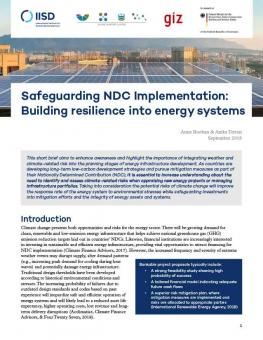
Safeguarding NDC Implementation: Building resilience into energy systems
This short brief aims to enhance awareness and highlight the importance of integrating weather and climate-related risk into the planning stages of energy infrastructure development.
This short brief aims to enhance awareness and highlight the importance of integrating weather and climate-related risk into the planning stages of energy infrastructure development.
As countries develop long-term, low-carbon development strategies and pursue mitigation measures as part of their Nationally Determined Contribution (NDC), it is essential to increase understanding about the need to identify and assess climate-related risks when appraising new energy projects or managing infrastructure portfolios. Taking into consideration the potential risks of climate change will improve the response rate of the energy system to environmental stresses while safeguarding investments into mitigation efforts and the integrity of energy assets and systems.
Participating experts
You might also be interested in
December 2024 | Carbon Minefields Oil and Gas Exploration Monitor
In November 2024, 23 oil and gas exploration licences were awarded across five countries, with Russia granting the licences that account for the largest portion of embodied emissions.
Increased Support Needed to Achieve India's Clean Energy Goals
India is on track to achieve many of its 2030 clean energy goals but needs to step up government support measures to accelerate the deployment of offshore wind, electric vehicles, and green hydrogen, according to a new report.
Budgeting for Net Zero
This study estimates the cost gap for battery energy storage systems (BESSs), offshore wind, solar photovoltaic (PV), electric vehicles (EVs), and green hydrogen (GH2) to inform government support.
Ending Export Credits for Oil and Gas: How OECD countries can end 2024 with a climate win
For a year now, Organisation of Petroleum Exporting Countries (OECD) governments have been negotiating an agreement that could put an end to oil and gas export finance. Following the acrimony in Baku, this would be a very real way for the OECD to show policy coherence, respond to calls from the poorest countries to stop subsidizing fossil fuels, and shift public finance to solutions.